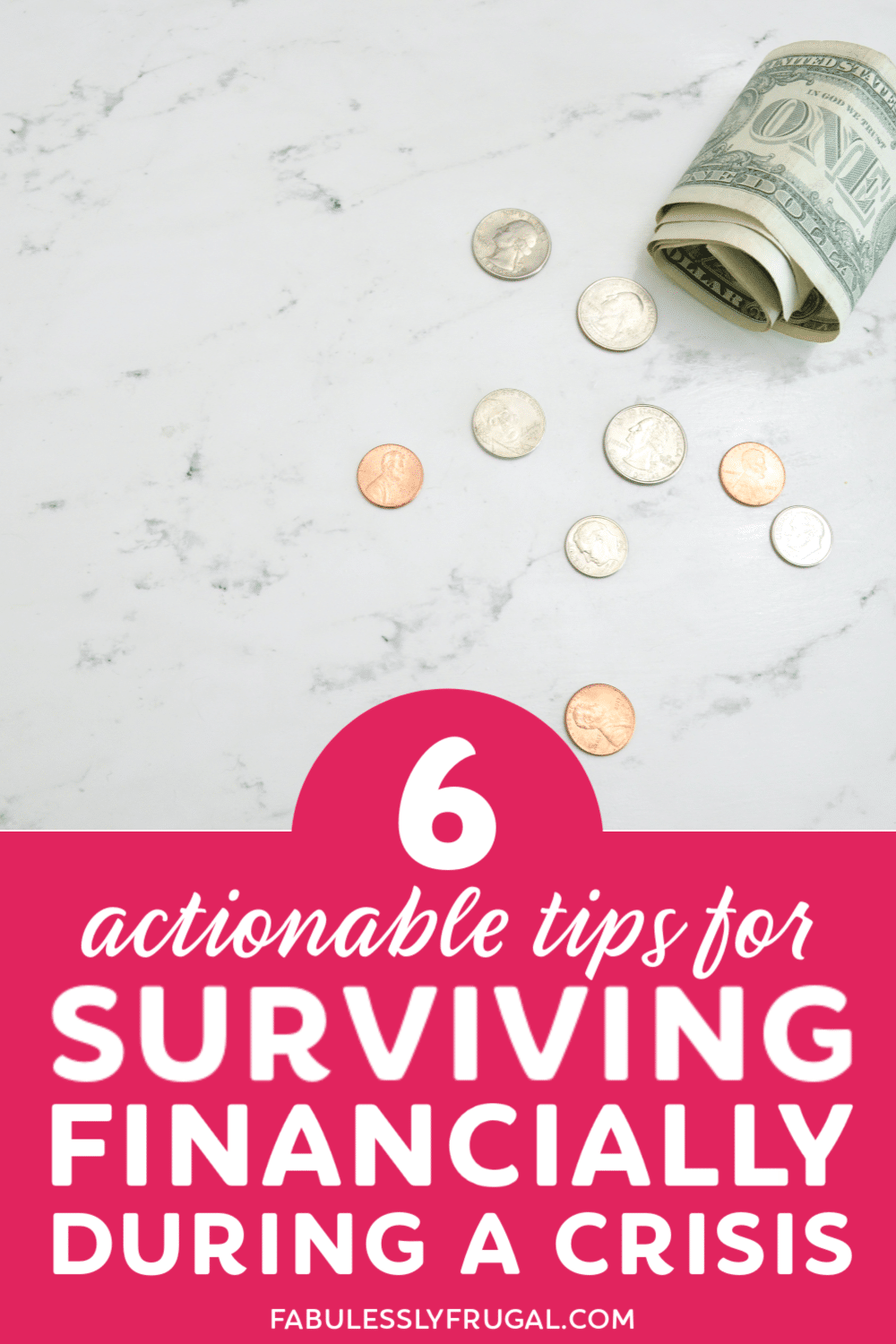How to Survive Financially During a Crisis (6 Tips)


Although the health and safety of our family members and community are at the top of our list of worries right now, there’s another thing being affected during this crisis, in a big way: our personal finances. If your income has slowed down or stopped completely, that’s a scary place to be!
Fortunately, there are steps you can take to relieve some anxiety and worry. If you’re struggling to make ends meet, don’t give up just yet.
Below, we’ve put together six actionable steps you can take today to put yourself in a better position for the coming weeks and months.
1. Start Actively Managing Your Money
If you don’t already have a solid system put together for managing your money, now is a great time to get that started. Setting up a budget will help you get an overview of your finances, the bills you’re paying, the savings you have, and more. All of this information will help you figure out your next steps.
Although this may be a bit overwhelming and potentially stressful at first, there are a lot of great resources out there to guide you through it. For me, Dave Ramsey was a huge help when I was learning about money management.
Another thing that I found (and still find) extremely helpful is You Need a Budget. It’s my favorite budgeting software and I’ve been using it since 2010! If you want to learn more about how it works and how to get set up, read my full YNAB review. Or, click here for a free 34-day YNAB trial.
One other place to learn more about money management and budgeting? Right here on Fabulessly Frugal! We have tons of personal finance posts for you to go through. Here are a few budgeting guides to start with:
- How to Make a Budget With 7 Bank Accounts
- How to Make a Simple Budget Easily in 5 Steps!
- The NON-cash Budget System
2. Apply for Financial Help
Make sure you’ve applied for unemployment and are utilizing any community services you’re eligible for. There are many different services and programs available to certain individuals, so be sure to research thoroughly. It takes time, but this is an easy step and a total game-changer if you’ve been heavily affected by the crisis.
I can’t list every different available program here, but this post is a great resource for finding financial help. Set aside an hour or two to read through it!
3. Cut Costs
Whether you’re temporarily unemployed or working shorter hours, if you’re not receiving the same level of income as you’re used to, now isn’t the time for a splurge. Now’s the time to cut costs and stretch your dollars as much as possible.
If you had an emergency fund prepared before this, you’re in a great position! Cutting costs will allow you to make that emergency fund last even longer.
If you don’t have an emergency fund, no worries. Try to start building one up with any income you do have and make sure to be even more frugal with your emergency spending plan.
Creating your emergency spending plan:
An emergency spending plan is essentially a bare-bones budget. No luxuries, no non-essentials, just the things you need to spend on for you and your family to survive.
This is another reason why tip #1 is so important. Once you have a budget put together and you have an idea of your spending, you should be able to find areas where you can cut back.
Here’s a quick guide finding places to reduce spending:
- Look through your recurring expenses, what non-essential things can be canceled?
- Do you have monthly payments on things like loans or cars? Take some time to make some phone calls and see how long you can defer payments. Tell them you’ve been affected by the current crisis and ask what they can do for you.
Just the two things above can make a big difference! Other than that, look for any other non-essential spending categories and either cut back or eliminate them completely. It’s unfortunate, but the good thing is this won’t last forever.
3. Keep Deal-Hunting
Ok, you’ve cut back or eliminated your non-essential spending categories at this point. Nice job! Now it’s time to figure out how to reduce your essential spending and get more value out of each dollar. This is where deal-hunting comes into play!
If you’ve been following Fabulessly Frugal for some time, you’re most likely already an avid deal hunter. Keep that up and keep looking for more savings opportunities!
A big area of spending right now is going to be on food and groceries. Check out our post on how to save money at the grocery store for a ton of great tips.
For me, another big way I save is by looking at the price per unit when shopping. This allows me to get the most value for my dollar.
Also, if you’re purchasing a new product, don’t forget to skim over recent reviews before making a purchase… cheaper isn’t always better!
Here are some more saving resources to help you out:
- Find New Deals and Coupons (Constantly Updated)
- Download the Fabulessly Frugal App for on-the-go deal-hunting
- Find Frugal Living & Money Saving Tips
4. Plan Ahead
Due to the measures that are in place right now, planning ahead has never been more important! Gone are the days of a quick run to the store for a missing ingredient to make dinner.
To combat this, I recommend planning your meals much farther ahead than you’re used to. For example, instead of planning for one week, start planning for the next 4 weeks. This is a bit of extra work, but with Prepear, you can get it done VERY quickly!
If you’re not sure what Prepear is, it’s a free meal planning app and I absolutely LOVE it. It only takes me about 30 minutes to make my entire meal plan and shopping list within the app (and I can do it all while soaking in the tub)!
On top of that, Prepear allows me to import my grocery list into the Walmart Grocery app, which is amazing! I then pay $12.95/mo for unlimited grocery delivery from Walmart. That way we can #stayhome, and this actually saves me money too. Here’s how:
- It eliminates the possibility of impulse purchases
- We’re buying less junk food
- We’re not eating out anymore
As a bonus, we’re eating healthier making everything from scratch, AND my kids are learning more about cooking and baking.
One last thing that helps me save not only money but time, is using the deal notifications on the Fabulessly Frugal app. I’m signed up to get alerted for deals on important household Staples, that way I spend less time searching online myself.
Once a notification comes in, I can act quickly and decide whether to make the purchase or not. Learn more about the app here.
5. Think Long Term
I know this seems like it will last forever, but there is an end in sight. Things will return to normal eventually, and you can use your time right now to think of some smart money moves for the future.
For example, it’s a good idea to make a list of items you’d like to have a 30, 60, and even 90 day supply of. Then, when things settle down and sales start to happen, you can take advantage and build up a stockpile for cheap.
By doing this, you’ll save yourself a lot of money. Having a bit of a stockpile of some essentials will definitely relieve some stress as well.
Again, the Fabulessly Frugal app can notify you of sales automatically, so that’s really handy!
6. Try to Make Extra Money
You may not be able to go out and find a job right now, but there are still opportunities to make money online! Don’t expect to find a full income replacement right off the bat, but even just an extra $100-$200/month can be a huge help.
And who knows, with enough work, the skills you gain and the things you learn through a small side hustle could eventually allow you to bring in a full-time income down the road. I started this blog for fun and look what it’s turned into!
Try these opportunities to get started:
- How to Start a Blog and Make Money From Home – I started Fabulessly Frugal during the recession of 2008, and I’m so glad I took the leap!
- 7 Ways to Make Money From Home as an English Speaker
- How to Make Make Money Taking Surveys from Home
- How to Make Money With DoorDash – This isn’t actually a work from home job, but there is a lot of demand for delivery drivers right now!
- Top 10 Best Selling Crafts to Make and Sell Yourself
Whatever you decide on doing, having an extra income source can be a life-saver.
Final Thoughts
Although they won’t solve everything, the six tips above are simple and actionable, and I hope they help you find a bit of peace of mind during this crisis. Stay safe!
If you’re stuck at home, check out our other #stayhome resources:
- 90+ Recipes to Make From Your Pantry
- 30 Best Free Online Educational Resources for Kids
- 44 Fun Indoor Activities for Kids Stuck at Home
- How to Start Homeschooling: The Ultimate Guide
- Simple Spring Cleaning Checklist (Room-By-Room)

The post How to Survive Financially During a Crisis (6 Tips) appeared first on Fabulessly Frugal.